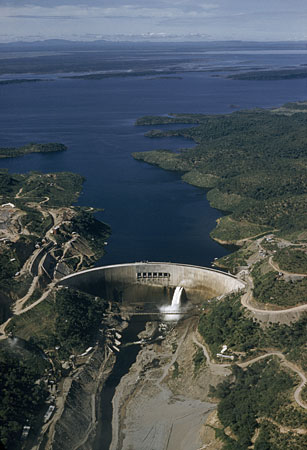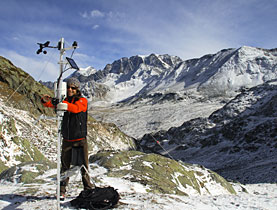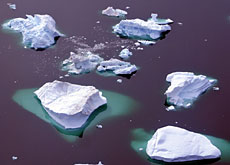Zambian river dam issues go under microscope

Swiss researchers are joining forces to tackle problems posed by dams built on one of Zambia's biggest rivers.
A multidisciplinary team from the Federal Institutes of Technology in Zurich (ETH) and Lausanne (EPFL) are using field studies to discover the effects of dams on ecosystems in the Zambezi river.
Their Africa Dams Project (Adapt) aims to find ways of optimising the use of water, benefiting people, the environment and the economy.
The team decided to carry out research in Africa as the continent has the highest untapped hydropower potential. But the current hydropower plants have faced international criticism.
Bernhard Wehrli, of ETH’s Institute of Biogeochemistry and Pollutant Dynamics, told swissinfo: “They have a huge potential to build more hydropower plants. They have also quite a bad record because many of these dams were constructed without a lot of involvement of civil society. There were some big failures, especially in the field of irrigation.
“The Zambezi is an interesting case because it involves several countries, it has several large dam structures, and we found partners who were interested in working with us. It is a huge area, almost as large as Switzerland.”
Five dams on the river basin were built during the past 50 years to supply electricity locally and to eight other countries.
But studies showed that ecological and social problems increased as a result.
Floods, flora and fauna
The dams have forced the resettlement of many people and entire villages continue to be flooded through inundations caused by sluices being opened.
Water quality is poor, the flora and fauna suffer and farmers have been forced to change agricultural habits from a flood-reliant system to artificial irrigation, leading many people to move closer to precarious flood plains.
The project was started in 2006 with a pilot phase to find how the river’s dams could be optimised sustainably and the water supply in the plains around the river improved, without having an adverse effect on the electricity industry.
The team says the project’s most outstanding quality is the pooling of disciplines in addressing the issues.
It brings together resources and experts from the fields of environmental and hydraulic engineering, integrative biology, pollutant dynamics water research and the study of developing countries.
“There is now a quest for so-called integrated river management in which not only the different scientific disciplines work together but they also work with communities, stakeholders, companies, and the public and private sector,” Wehrli explained.
Adapt is now officially underway and collaborating with Zambia University, electricity companies and the river water authority.
Initial findings show the development of a noxious weed, mimoa pigra, in one flood plain since the Itezhi Tezhi dam was built on a major tributary of the Zambezi. Grazing land has become scarcer in regions subject to prolonged flooding, which has affected antelope indigenous to the area.
Continuity
The project aims to pave the way for better flood predictions and improved operation of the dams for people living downstream.
It is expected to last several years and it is planned to extend to a test project on Zambezi tributaries leading to Mozambique before the end of 2008.
The Zambezi study is building on previous research carried out in the region by the environment group WWF on natural river flows.
“When we came there we realised there had to be a follow-up because many of these initiatives have a time frame. People pull out and then the whole effort collapses and there is not enough capacity at the local level to continue,” Wehrli said.
“It is important that there is a chain of projects in African countries so that local researchers can continue their work.”
swissinfo, Jessica Dacey
Adapt started as a pilot project before becoming a collaborative effort including Swiss experts, Zambia University, the state-owned power firm and other suppliers, as well as the river authorities.
It unites professors and researchers from the ETH Zurich’s Center for Comparative and International Studies, Postgraduate Studies on Developing Countries, the Institute for Environmental Engineering, the Institute of Integrative Biology, the Institute of Biogeochemistry and Pollutant Dynamics and the ETH Domain’s Water Research Institute.
The Hydraulic Engineering Laboratory, the Departments of Environmental Sciences and of Civil, Environmental and Geomatic Engineering and the Department of Humanities, Social Sciences and Political Science at EPFL in Lausanne are also partners.

In compliance with the JTI standards
More: SWI swissinfo.ch certified by the Journalism Trust Initiative




You can find an overview of ongoing debates with our journalists here. Please join us!
If you want to start a conversation about a topic raised in this article or want to report factual errors, email us at english@swissinfo.ch.